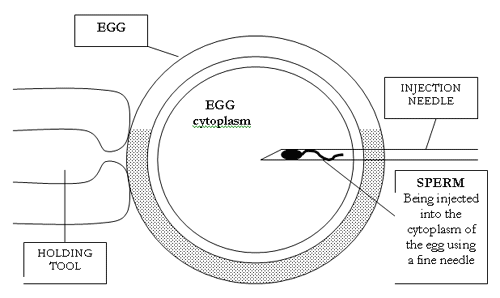ICSI Procedure & Treatment (Intracytoplasmic sperm injection)
What is ICSI? | The Procedure & Who It Is Suitable For
Intracytoplasmic sperm injection (ICSI) is very similar to conventional IVF in that gametes (eggs and sperm) are collected from each partner. The difference between the two procedures is the method of achieving fertilisation.
ICSI refers to the laboratory procedure where a single sperm is picked up with a fine glass needle and is injected directly into each egg (Figure 1). This is carried out in the laboratory by experienced embryologists using specialist equipment. Very few sperm are required and the ability of the sperm to penetrate the egg is no longer important as this has been assisted by the ICSI technique. ICSI does not guarantee that fertilisation will occur as the normal cellular events of fertilisation still need to occur once the sperm has been placed in the egg.
Figure 1: ICSI process
Figure 1. Diagram illustrating the process of intracytoplasmic sperm injection (ICSI). The egg is held in place while a single sperm is injected into the cytoplasm of the egg using a very fine needle.

Who is ICSI suitable for?
From a patient perspective, undergoing an ICSI treatment cycle is exactly the same as a conventional IVF cycle, and the same steps are involved.
Circumstances in which ICSI may be appropriate include:- When the sperm count is very low
- When the sperm cannot move properly or are in other ways abnormal
- When sperm has been retrieved surgically from the epididymis (MESA/PESA) or the testes
- (TESE/TESA), from urine or following electro-ejaculation
- When there are high levels of antibodies in the semen
- When there has been a previous fertilisation failure using conventional IVF.
What does ICSI involve?
From a patient perspective, undergoing an ICSI treatment cycle is exactly the same as a conventional IVF cycle. These step are described more fully under IVF.
- Stimulation of the ovaries to encourage development and maturation of the eggs
- Retrieval of the eggs
- Fertilisation of the eggs and culture of the embryos
- Transfer of the embryos back into the uterus.
How Successful is ICSI?
Chances of success vary between patients, particularly according to the age of the woman, but on average about 25% of patients will have a baby after one attempt at ICSI.
FAQs
The team have worked together to prepare some of the more frequently asked questions we receive from patients. Find them here.
Can ICSI help me fall pregnant?
To find out whether ICSI can help you fall pregnant, please book an appointment with a SimsIVF fertility specialist or contact us.
For further information on TESE and what it involves, check it out here >
